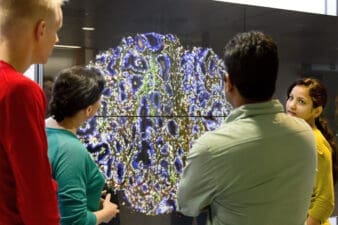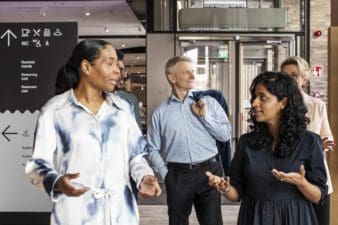Why Helsinki is the best place for foodtech innovation: Perspectives from a VC, research organisation, and business founder
Learn what factors make Helsinki a vibrant hub for innovation, investment, and research from three unique perspectives.

7 min read
The Helsinki foodtech ecosystem offers cutting-edge research, a supportive community, and robust investment opportunities. In fact, funding for the Finnish foodtech sector has grown dramatically since 2015, with international investors also joining funding rounds. And by 2025, the Finnish foodtech ecosystem is expected to experience a growth rate of around 40%.
In this article, we’ll explore the factors that make Helsinki an ideal place for foodtech advancements and sustainable growth, with insights from a venture capitalist, research organisation, and a business founder:
- Lauri Reuter, co-founder and partner at Nordic Foodtech VC
- Janne Saarikko, ecosystem builder, portfolio developer, and business advisor at Natural Resources Institute Finland (Luke)
- Ari Tulla, co-founder and CEO of Elo Health
Well-established and forward-looking food industry
Finland’s food industry is the country’s largest manufacturer of consumer goods, with big industry players actively involved in new foodtech products through innovation and investments.
Lauri Reuter of Nordic Foodtech VC— the first early-stage VC fund in the Nordics fully focused on foodtech startups—shares his view: “Companies like Valio and Fazer have been around for a century and are trailblazers in their fields. These are both tech-savvy companies that have done a lot of research. So we have the capability to create new technologies and new products—the muscle is there.”
Valio, for example, has been studying cellular agriculture opportunities since 2021 and started collaborating with Enifer on research related to PEKILO® protein in 2022. Nordic Foodtech VC led the first investment round in Enifer already in 2020, and along with other firms, took part in Enifer’s Series A round of financing.
Fazer, one of the Nordics’ largest food companies, creates novel products and technologies and funds research at universities, research institutes, and its own Fazer Lab. The company also funds several ongoing proprietary research projects such as Fazer Xtech and Solein2Food, which aims to create new foods with Solar Foods’ carbon neutral Solein protein.
Strong and broad research & technical capabilities
Helsinki’s foodtech ecosystem is driven by R&D. Janne Saarikko from the Natural Resources Institute Finland (Luke) explains: “For VCs and their deal flow—especially when it comes to the research phase—Finland is a hidden gem of innovation. International investors are surprised when I tell them about the things we have here. It’s not the number of startups, but it’s the quality. And it’s not the number of new ideas, but the validity of those ideas.”
Finland is a hidden gem of innovation […] It’s not the number of startups, but it’s the quality. And it’s not the number of new ideas, but the validity of those ideas.
Janne Saarikko from the Natural Resources Institute Finland
Research organisations like Luke and the VTT Technical Research Centre of Finland have a long history of developing innovations related to agriculture and plant genetics. Several Helsinki foodtech startups, like Onego Bio, are spinoffs from such research organisations. Working with 1,300 nature-based scientists at Luke, Janne explains the importance of R&D: “You need scientists in order to innovate, and you need research before doing trial and error. If you don’t have solid research and understanding as a foundation, you won’t be able to find new solutions.”
Lauri shares the same sentiment: “In addition to making incremental changes like eating more plants and less meat, we need more radical new technologies. There is no other place for those to come from than scientific discovery, and that happens in universities and research institutions.”
Finland’s strong educational system also bolsters the foodtech industry, as a range of specialities are needed to advance the foodtech sector, from mathematicians to biologists and chemists. Although not all of Helsinki’s R&D capabilities are directly focused on the food industry, they still support the development of the food chain.
For example, Enifer did not come out of food research, but from forest industry research. The company uses biobased side streams to produce its product, which is now a hot topic in foodtech. And while Finnish space technology startup Kuva Space is not directly related to food or agriculture, the satellites are extremely useful for agricultural data.
“Our history in the forestry and paper industry now funnels into these new technological solutions in food,” says Lauri. “There is a massive amount of good competence, capabilities, and technologies in the Nordics related to food and agriculture that is still unused. And at Nordic Foodtech VC, our job is to support at least some of those people to build their ideas into companies,” he continues.
Many global companies value the R&D opportunities in Helsinki. For example, Elo Health is a smart nutrition company founded by Finns, headquartered in San Francisco, with an R&D hub in Helsinki.
Co-founder and CEO of Elo Health, Ari Tulla, shares: “Access to talent, retention, and cost are the main reasons we chose Helsinki for our R&D hub. People in Finland don’t tend to change jobs every year like they do in Silicon Valley. We have a small team of eight people in Finland today, focusing on platform development and data science, but we expect to grow in the coming years.”
Access to talent, retention, and cost are the main reasons we chose Helsinki for our R&D hub.
Ari Tulla, CEO of Elo Health
Elo Health is also looking to partner with Finnish organisations that have a big footprint in the US, like Polar Electro, Suunto, and Oura. “Finland has good products coming out in the activity tracking and wearable device spaces,” says Ari.
Open-minded population
Finns are eager to experiment with new food products and eat sustainably. Lauri explains: “Finland has a young food culture. It’s not rigid and conservative like in some other European countries. We’re ready to try new things and are open-minded towards new types of solutions in the food industry. Also, it’s damn hard to grow anything in traditional ways in Finland—you have to come up with new things.”
Maija Itkonen, CEO of Onego Bio shares the same opinion, explaining that VTT had the idea to house bio- and food sciences under one roof to drive innovation: “There is something quintessentially Finnish about such an open-minded approach, not characterised by bureaucracy. To drive change, we need people that are fearless, innovative, and willing to do things a bit differently.”
Support from public institutions and partners
Support from public institutions and strong public-private partnerships in Helsinki foster rapid development in food technology. “What makes Finland quite exceptional is the strong, societal support for companies that are creating something super impactful. There are grants available and governmental support for building something new that has a positive impact. This makes investors’ lives easier as well,” says Lauri.
What makes Finland quite exceptional is the strong, societal support for companies that are creating something super impactful.
Lauri Reuter, co-founder and partner at Nordic Foodtech VC
Janne elaborates on the importance of collaboration: “The role of research organisations is crucial because we need people to make quick and agile innovations, bring them to the market, and make them available for everyone. We also need big players in the industry who have the power to push things to the market and make large-scale changes. And finally, we need the public ecosystem—the regulation and funding in order to make that systemic change. In Finland, all these sectors work together.”
What’s more, Helsinki’s stable societal infrastructure makes it a great place to live and work. “It’s fairly easy to come here, study, and work in English. The combination of societal, technological, and educational benefits, plus the natural resources, make for a thriving foodtech sector,” says Janne.
Companies with operations in Finland are also well connected to the rest of the Nordics. Lauri shares: “If you start a new foodtech company in Finland, you’re building it for global markets, in the context of the European sandbox of foodtech startups. Especially when it comes to later-stage companies, you’ll have to work with global investors.” For example, Elo Health got funding from Sweden-based investment firm Re:food and UK-based Octopus Ventures.
Focus on climate issues and sustainability
Finnish foodtech companies have gained a reputation for their focus on sustainable food production. One major reason for the foodtech sector’s tremendous growth in recent years is the climate issues we’re facing worldwide. “Over the last five years, food is increasingly seen as a climate issue. It’s always been a climate issue, but it hasn’t been so broadly discussed as a climate issue as it is now,” says Lauri.
Food and agrifood account for a major part of climate issues, whether it’s about creating more food, or reducing food waste, CO2 emissions, and the use of pesticides. The world population is growing and there’s an ever-growing demand for new food solutions—beyond just reducing meat consumption.
“We’re at a stage where we don’t even have enough arable land to create plant-based foods, so we have to come up with new things, which will be increasingly technology-oriented solutions,” says Janne.
Regulation around corporate sustainability is also increasing. For example, the EU’s recent corporate sustainability due diligence directive will require all businesses to show what actions they’re taking to protect human rights and the environment. Janne explains: “Companies will have to show where their products come from, their carbon values, and trace everything back to the roots. This will be a huge thing in the coming years.”
Advice for entering the Helsinki foodtech sector
Growth companies, corporations, and investors have a lot to gain from the city’s foodtech ecosystem. “Helsinki is among the top 10 foodtech ecosystems in the world,” says Janne. “The flat structure and lack of hierarchy is one of our main benefits. Unlike in many other countries, you can talk to the top person of an organisation here, and it’s no big deal. So go and mingle with the ecosystem, and keep up discussions with people here. There are big global VCs that have established themselves in Helsinki in order to keep up with what’s going on in the ecosystem.”
If you’re an innovative high-tech fast growing foodtech company interested in expanding to Helsinki, the best place to start is Helsinki Partners. Our Senior Advisor, Maria Andros, can help you find all the information you need to make the right decisions for your business.
Contact our Senior Advisor Maria Andros to learn more about the opportunities in the foodtech ecosystem.

Maria Andros
Senior Advisor, Growth and Investments
Green Transition
maria.melnikova(at)helsinkipartners.com
+358 50 523 7417


